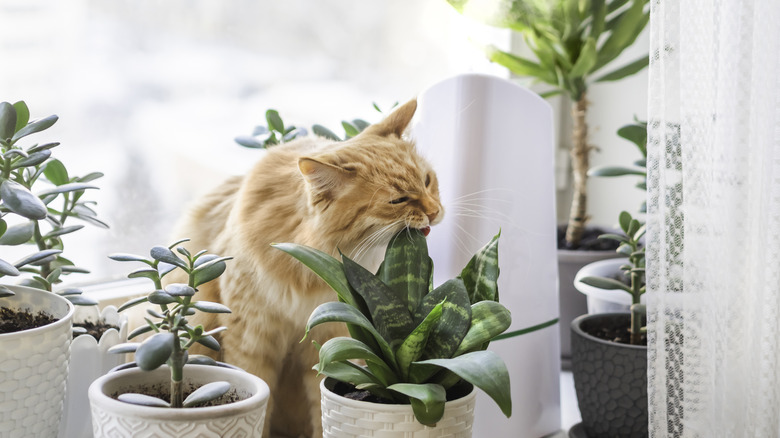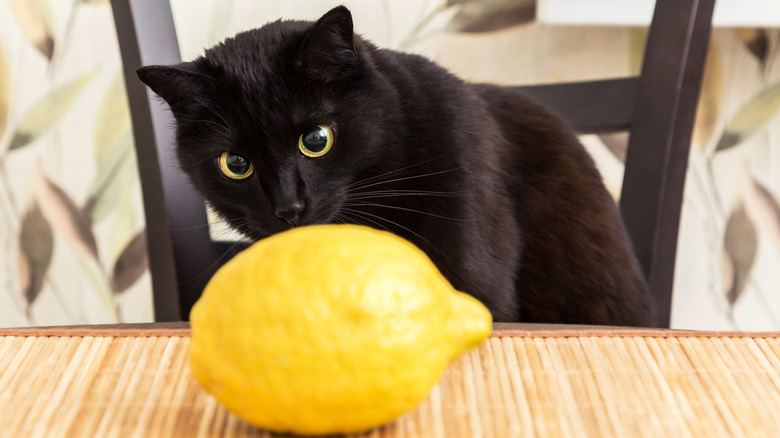Keep Cats Off Your Houseplants With One Ingredient From The Kitchen
You just brought home a brand new, beautiful houseplant, only to find your cat digging away in the soil and munching on the leaves. You only turned your back for a few moments; yet, there they are, destroying your chances of ever developing a green thumb. Do they have a plant radar or something?
As it turns out, cats love to use their mouths to investigate their surroundings. The wiggling of houseplant leaves, combined with the fun, diggable dirt may just be too enticing for your kitty to avoid. However, this natural instinct can be dangerous for your feline, as many indoor plants are poisonous to cats if eaten. Luckily, there's a simple solution right in your kitchen that can deter cats from houseplants: lemons. The strong citrus scent combined with your kitty's heightened sense of smell typically makes the fruit unpalatable to them, keeping them far away from whatever you place the lemon near.
@interiorswithcats My training methods must have been super effective because it's two years later and they haven't chewed a plant since 👏🏻🙀 Here's how you can achieve the same results but I want to be clear... This didn't happen overnight‼️ I remember, when my cats were tiny kittens and I didn't know them that well yet, I used to pick up all of my most toxic (NOT deadly) house plants and put them on shelves before going to class or when I was sleeping. I remember going to the cafe in my student dorm so I could get fresh citrus for my houseplants 😹🍋 This took a lot of time, consistency, and patience... Just like with any worthwhile thing in life. Let's get into these game-changing tips ⤵️ 1️⃣ Deter With Citrus: Most cats have a natural aversion to the smell of citrus, making it a simple and naturally effective way of keeping them away from your plants. Squeeze citrus juice directly on to your plant's pots (do NOT squeeze it onto the leaves) and your cats will stay away! 2️⃣ Easy Tricks to Keep Cats from Digging in Plant Soil: Stop your naughty kitty from digging in the soil around your plants by using lava rocks, stones, or tin foil. Cats dislike the texture of these materials and won't want to stand on them for long. 3️⃣ Double-sided sticky tape has worked very well for me! Simply place sticky tape on your pots and around them. Cats dislike stepping on the sticky surface and will quickly learn to investigate something else. 4️⃣ Make Your Plants Inaccessible Hang your plants in pots away from any furniture your cat could use to reach them. The goal is to make your plants inaccessible. 5️⃣ Give Your Cat Their Own Plant: Cats often chew on plant leaves to soothe their tummies, so the solution is to get your cat their own plant: cat grass! Cat grass is safe for your cat and can help them process hairballs, digest their food, and alleviate an upset stomach. Keep the grass misted and make sure to toss it before it grows mold (it stays fresh for about two weeks). There you go! 👏🏻 🤍 Follow @interiorswithcats for more ways of living harmoniously with cats tipstipsforpetownersstipsforcatownerspcatproductstheylovepcatproductdragdollcatdragdolltaesthetichometaesthetichomedecoradreamfurnitureubeautifulhomeeinteriorstylingeinteriorsteintetiorswithpetseinteriordesignehomee#interiorswithcats #catscatsbtabbycatsdragdollcatsdragdollmixemixedragdolldragdolltabbydragdolltabbymixdragdolltabbycattmittedragdollecutecatnfunnycatecutecatsnfunnycatstaestheticcatproductstaestheticpetproductsacleaningwithcatsacleaningasmrelinenbeddingelineniwabisabiisabihome
To try the hack at home, take an unpeeled lemon, cut it into slices, and put the pieces in the dirt around the plant you wish to protect. The aroma diminishes over time, so it's a good idea to replace the lemons after they've dried out or stopped emitting a scent. According to PetMD, you can also create a spray that serves the same purpose by boiling 3 cups of water, turning off the heat and steeping a ½ cup of fresh rosemary in the water overnight, straining the rosemary out, and combining the herb-infused water with ¾ cup distilled white vinegar and ¼ cup lemon juice in a spray bottle. Give it a shake and then spritz it on your plants (or even your Christmas tree).
What to consider before using lemon as a cat deterrent
Citrus fruits contain chemicals that can be poisonous to cats. One ingredient, psoralen, can cause skin irritation and dermatitis if a feline is exposed to the juice. Lemon also contains the essential oils limonene and linalool, which are most concentrated in the peel. These irritants can lead to digestive issues such as vomiting, diarrhea, drooling, and neurologic problems if eaten in large amounts.
Thankfully, per Wag's Dr. Linda Simon, most cats will avoid citrus scents, and it takes a very large amount of lemon ingestion to cause severe symptoms. If you are concerned, using a quick-drying spray or peeling your lemons before adding them to your plants may help. In most cases, your cat will be deterred enough by the scent to steer clear of taking a bite. However, if they do eat part of any citrus fruit, you should seek help from a veterinary professional immediately. If your feline is somehow enticed by lemon, trying out other houseplant hacks for cats like the aluminum foil trick may work better.

